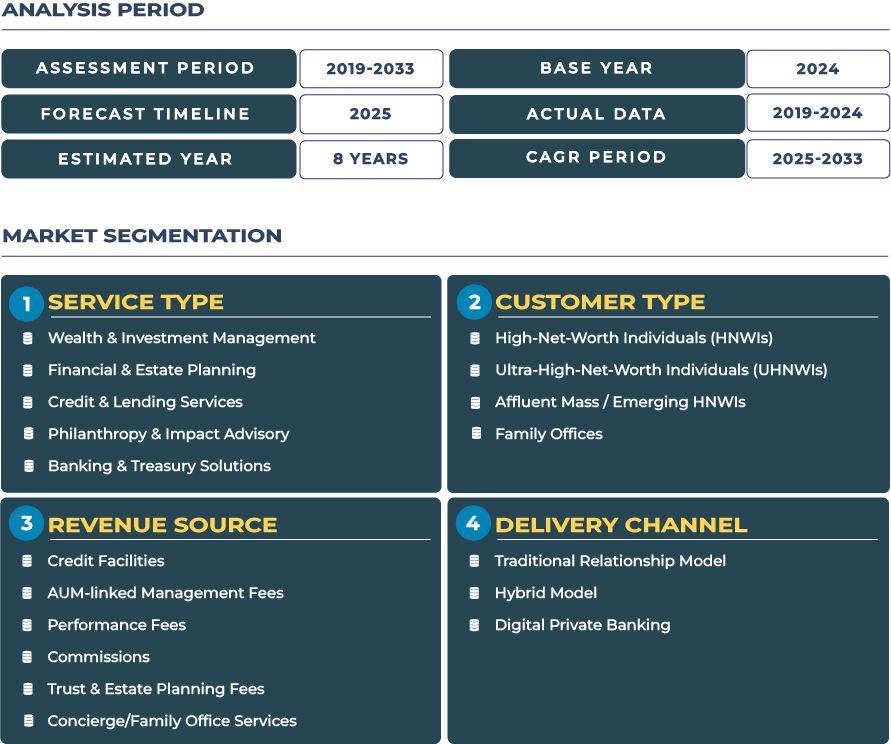Global Wealth Hub Diversification Driving Singapore Private Banking Market
Singapore is repositioning itself as a diversified global private-wealth hub-leveraging its robust regulatory regime, strategic location in Asia and growing family-office ecosystem to support high-net-worth individuals (HNWIs) across multiple jurisdictions. The private banking market in Singapore is projected to reach approximately USD 17.0 billion in 2025 and is forecast to grow to around USD 25.5 billion by 2033, implying a CAGR of roughly 5.2% during the forecast period. This projected growth underscores Singapore appeal as a destination for both regional and global wealth looking for stable capital-markets access, transparent regulation and enriched wealth-management service models.
Note:* The market size refers to the total revenue generated by banks through various services.
Within this evolving private banking landscape, institutions are expanding beyond traditional asset management and advisory to deliver integrated platforms that combine investment strategy, estate & legacy planning, credit & lending solutions, philanthropy & impact advisory and banking & treasury services. Singapore transition from a purely offshore wealth booking centre to a value-added private-wealth platform is underpinned by its regulatory sophistication (via Monetary Authority of Singapore (MAS)), its fund-structuring frameworks such as the Variable Capital Company (VCC), and its proactive positioning of family-office domiciles. In a dynamic environment of global capital flows, geopolitics and digital innovation, Singapore private banking sector must continuously adapt to capture growing wallet share while maintaining the trust and governance standards that underpin its hub status.
Singapore Private Banking Market Outlook: Positioning Singapore Private Banking Market for Strategy Driven Growth to 2033
Singapore private banking sector indicates a focus on quality of growth and diversification as much as scale. The sector is primed to advance through deeper client segmentation, enhanced wealth-platform capabilities and an evolving service architecture tailored for global family wealth.
Key enablers include Singapore transparent regulatory environment and wealth-structuring infrastructure, which attract family offices, returning expatriates and cross-border HNWIs. The city-state’s status as a fund-domicile and wealth-management centre underscores the scale of the ecosystem.
Private banking firms in Singapore are focusing increasingly on strategic service layers: global custodial solutions, bespoke lending/treasury, inter-generational wealth transition, philanthropic advisory and digital client servicing. Meanwhile, external headwinds such as rising regulatory compliance costs, talent scarcity and global tax/AML reforms pose structural challenges. Consequently, the success of the Singapore private banking market will hinge on the ability of institutions to integrate technology, deliver advisory-rich experiences and differentiate through ecosystem value rather than purely asset volumes.
Driving Forces and Structural Constraints in Singapore Private Banking Market
Regional Wealth Hub, Transparent Regulation and Technology Innovation
Singapore appeal as a regional wealth hub is underpinned by its political stability, rule of law, English-language capability and strong governance frameworks. The MAS has issued guidance such as “Guidance on Private Banking Controls” and related AML/CFT frameworks that reinforce trust and transparency in the private banking ecosystem. Technological innovation is also a driver: wealth-tech platforms, digital onboarding, open-banking APIs and data-driven advisory are enabling private banks to deliver scalable and differentiated client experiences.
Cost of Compliance, Talent Scarcity and Housing-Cost Pressures
However, the Singapore private banking market faces meaningful structural constraints. The cost of compliance, particularly in the areas of AML, tax disclosure, KYC and cross-border structuring, has increased substantially, reducing margins for boutique offerings. Talent scarcity is acute-relationship managers (RMs) with cross-border, multilingual, family-office and fintech skills are in short supply. Additionally, Singapore high-cost base-including housing, staff and operations-puts pressure on service-model economics, especially for firms targeting smaller affluent segments.
Major Trends and Strategic Opportunity Windows in Singapore Private Banking Ecosystem
Digital Family-Office Boom, Multi-Jurisdiction Structuring and ESG Integration
Singapore private banking sector is witnessing a surge in family-office establishments, supported by regulatory incentives and the VCC structure; this trend is elevating demand for bespoke wealth services. Multi-jurisdiction structuring-spanning Asia, Europe, Middle East and USA-is becoming a default client requirement, positioning Singapore as a bridge between jurisdictions. ESG integration is now a strategic differentiator; the Association of Banks in Singapore(ABS) and MAS have issued guidelines on sustainable private banking and wealth-management training.
Cross-border Wealth HQs, Family-Office Digitalization and Green-Finance Advisory
Private banking firms in Singapore have several strategic opportunities to capture. First, positioning Singapore as the wealth HQ for clients with cross-border assets gives firms a chance to build high-value mandates. Second, digitizing the family-office model-through multi-family office platforms, digital dashboards and scalable advice-enables broader reach and cost efficiency. Third, green-finance advisory and impact-wealth products (for example, sustainable bonds, impact-venture funds) offer differentiation for sophisticated clients aligning wealth with values. Firms that exploit these windows will build durable competitive advantage in Singapore private banking market.
Competitive Landscape: Platform-Led Wealth Strategies in Singapore Private Banking Sector
The competitive landscape in Singapore private banking industry comprises global banks, regional Asian players and specialist boutique firms. A leading institution, DBS Bank Private Bank, has been recognized for its wealth-management strategy, securing national awards and developing a multi-family-office ecosystem. Banks are increasingly focusing on creating integrated platforms-blending investment management, structured credit/treasury, family-office advisory, digital engagement and regional research capabilities. The firms that succeed will be those able to deliver an end-to-end wealth journey rather than siloed product channels, integrating client-life-cycle services under one canopy of experience.







